...the muff1 as a garment first appeared over 500 years ago in
Venice, and was first worn by men. Women took a fancy to2 it at
the end of the XVIII century, but at first they wore it only in
summer.
...the students of Oxford University wear black gowns.3
...present-day raincoats come from mackintoshes, coats made of
waterproof4 material, named after the Englishman Charles Mackin-
tosh (1766—1843), the inventor.6
IT IS NECESSARY TO KNOW ТВ AT
1) One should not follow6 every turn of the latest fashions blind-
ly. 7 2) A girl should adapt8 a fashion to her own personality and
should not adapt herself to it, whether the fashion is suited to her
or not. 3) Clothes should be neat,9 well-made, in perfect taste,10 but
not too conspicuous. ll 4) Do not wear clothes that need constant ar-
ranging. 5) Accessoriesia should always be in harmony with the dress
and the wearer. 6) A woman does not take off her gloves to shake
hands, no matter when and where, and never apologizes13 for wearing
gloves when shaking hands. A man wearing gloves never shakes
hands with a woman without first taking off his right glove. If in
the street he cannot free his left hand to take his right glove off,
he says "Excuse me glove". 7) When arranging a party, a hostesfu
should be less elaborately15 dressed than her guests.
1 muff — муфта
2 to take a fancy to — увлекаться
3 gown [gaun] — мантия
4 waterproof ['woitsprtri] — непромокаемый
5 inventor —изобретатель
8 one should not follow —не нужно следовать
7 blindly ['blamdli] —слепо
8 to adapt [a'daept]— приспосабливать
9 neat — опрятный
10 taste [teistj — вкус
11 conspicuous [kan'spikjuas]— бросающийся в глаза, кричащий
12 accessories [ak'sesgnzj — аксессуары (шарф, перчатки, сумка и т. п.)
13 to apologize [a'pDbdsaizl — извиняться
14 hostess — хозяйка
16 elaborately [I'laebsntli] — изысканный, искусный

|
FAVOURITE, BELOVED
Their favourite TV programme
is Ogonyok, too.
"What a fine writing-table! And
this chair with the leather cushion1
looks very comfortable."
"It really is! But when I work
at my writing-table I like to sit
on a wooden chair, the one stand-
ing in the corner."
"I also have a favourite chair
at home. In our family everyone
has Ше^р favourite place."
"Ithink it is the same with any family. Take ours, for instance.
When Dad reads his papers in the evening he always sits in this
arm-chair. And this couch 2 with cushions is my granny's favourite
place. She always sits here when watching TV."
"But this little chair is your younger brother's favourite, isn't it?"
"No, he prefers to sit on the couch, next to Granny. She won't
enjoy the performance if Sasha is not sitting beside her. She starts
fidgeting3 and wonders: "Where is my beloved grandson?"
"Why does she call Sasha beloved? Doesn't she love you and
Igor—you're her grandsons too?"
"Yes, she does love us, but Sasha is her favourite. Indeed, he
is a very nice boy. He is loved by everyone who knows him."
"That's true. I also love him."
REMEMBER:
Favourite describes something or somebody we like and prefer
above all others.
Beloved is used when one speaks of somebody very much loved
and dear.
Exercises
1. From eelumn A choose adjectives which may go with nouns from column B.
1 cushion ['kujan]—сидение
8 couch Jkautf] —кушетка, диван
8 to fidget I'fH%it}—сидеть неспокойно, вертеться
А. В.
| beloved | paper | author | man | grandfather |
| favourite | park | girl | meal | sport |
| brother | novel | song | artist |
II. Fill in the blanks with favourite or beloved.
1. Who is your... Russian poet? 2. The old man's... place
for a walk with his grandson was the seashore, where little Alec
could run about in search of 1 seashells,2 which he would bring
to show to his... grandfather. 3. Gaidar's books are among
the most... books of all the children of our country. 4. She
liked Tatyana Larina, but Natasha Rostova was her... heroine.
5. On the 8th of March men present their ♦.. women with
flowers. 6. He was in a hurry because he didn't want to be late
for a lecture on his... subject. 7. I subscribe3 to many dif-
ferent newspapers and magazines, but my... newspaper is
Komsomolskaya Pravda. 8. "Oh, my...! I was blind, your love
was true," Othello sobbed4 over his dead Desdemona. 9. It was
a... expression of Theophrastus5 that time was the most val-
uable6 thing that a man could spend. 10. This story has been
... reading matter for schoolgirls for many years.
III. What are their favourite games and sports? Is it always easy to say?

1 in search of — в поисках
2 seashell — ракушка
3 to subscribe (to) — подписываться, выписывать
4 to sob — рыдать
6 Theophrastus — Теофраст, древнегреческий философ и естествоиспытатель
6 valuable ['vaeljuablj—ценный

|
| Write one or two sentences to each of the pictures, using the words beloved or favourite. to stretch out— протягивать руку occupation—занятие |
V. Paraphrase x each sentence, using beloved or favourite as shown in the model.
Model: 1. Mike says he likes Tchaikovsky most of all compos-
ers.— Tchaikovsky is Mike's favourite composer.
2. Mike loves his sister Nelly very much.— Nelly is
Mike's beloved sister.
1. Of all his sisters Peter loved blue-eyed Vera most of all.
2. Dick prefers boxing to all other sports and games.
3. They often go to the circus2 to see different programmes,
but they like the performances with Yuri Nikulin most
of all.
4. The mother says she loves all her sons.
5. The cat liked to sleep in the middle of the porch3.
6. Of all English poets Oleg likes Shelley most of all.
7. When he studies in the reading hall he always sits near
the window.
1 paraphrase ['paerafreiz] — перефразировать, сказать другими словами
2 circus ['sakss]—цирк
8 porch —крыльцо
8. My mother and I never miss the Travellers' Club TV Prog-
ramme, because we like it best of all.
9. "Which kitten does the mother cat love most of all?"
"But they are all dear to her."
10. Kate likes knitting most of all.
VI. Play the game My Favourite.
Find out what your class-mate's favourite book is (author, play-
wright1, actor, pianist, sport, dish, occupation, record2, film, song,
etc.) by asking him general questions, like this (you are finding
out what is your class-mate's favourite sport);
"Is it a summer sport?"
"No, it isn't."
"Is it a winter sport?"
"Yes, it is."
"Is it played?"
"No, it isn't."
"Are special natural conditions3 necessary for it?"
"Yes, they are."
"Is it snow?"
"Yes, it is."
"Then your favourite, sport is skiing, isn't it?"
"Yes, it is."
Let your class-mates ask you questions to find out your favourites, too.
VII. Do you remember:
1. What Pavka Korchagin's favourite book was?
2. What Davidov's (the main hero of Virgin Soil Upturned*)
favourite word was?
3. Who Oleg Koshevoy's favourite hero was?
4. Who Taras Bulba's favourite son was?
5. In what book a mother tells of her beloved daughter and
son who gave up their lives for the freedom and independence
of our country.
1 playwright ['pleirait] — драматург
2 record frekad] — пластинка
3 natural conditions — природные условия
4 Virgin Soil Upturned —«Поднятая целина» (М. Шолохов)
G3
TIMM FOB FUN
HIS FAVOURITE MUSIC
"Do you like music, John?"
"Oh, yes, indeed."
"And which piece of music do you like most of all."
"When the bugler1 blows the dinner time signal."

|
TO LEARN, TO FIND OUT,
TO DISCOVER
"How did mama find cut you didn't
really take a bath?"
"I forgot to wet the soap."
If you take an English dictionary and
look through it, you will probably be sur-
prised to discover that a great number of words
in the dictionary have more than one meaning. So if you look up
the word to learn you will find cut that it means not only to
study, but it may also mean to be informed or to receive informa-
tion about something as in the sentence / was sorry to learn that
our street football team again lost the game. In the second meaning
the word to learn is very close to the words to discover and to find
out. If you take a further look at these words in the dictionary,
you will find out this: the word to learn denotes that the learner
gets information without any or much effort on his part, while the
word to discover suggests that the new information is surprising,
that the learner came to understand something quite unexpectedly,
as in the sentence / suddenly discovered that I had left my foun-
tain-pen in the library.
Having read this introduction2 Peter grew interested in dic-
tionaries. When he came home from school, he wanted to look up
the word to find out in his dictionary. He took the dictionary
from the bookshelf where he kept all his books and suddenly dis-
covered that a bookworm3 had eaten its way from the first page
to the last. Luckily it had not "eaten" the word to find out, and
1 bugler ['bjirgb] —горнист
* introduction [,т!гэ'с1лкТп]—вступительная часть
3 bookworm ['bukwam]—кнйжняй червь
Peter could read that this word means to get knowledge by search
or inquiry.x
That was exactly what Peter did. He looked up the word in
the dictionary and as a result of his search he found out its mean-
ing.
Don't leave dictionaries for bookworms to feed themselves2 on.
Read them! Use them! They are very useful.
Exercises
I. Fill in the blanks with the words to learn, to find out or to discover in the
required form.
1. The other part of the book tells us what young naturalists
can do to... about animals and plants living in different sur-
roundings. 3 2. When Pierre Curie... about his wife's discov-
ery he decided to leave his own researches4 and to help his
wife in her work. 3. I am sad to... the news of Kim being
ill. 4. Ring him up to... if he is at home. 5. We suddenly
... that it was too late to catch the train. 6. Many foreign
delegates come to our country to... just what the USSR is
doing and report this back to their friends. 7. She... that the
whole story was untrue. 8. It's interesting to... that the
legend of King Arthur is probably based on a real hero of the
Britons. 9. For a long time they tried to... something about
their adopted5 daughter's past but to no avail.6 10. Look at
the time-table and you will... the time and the place of all
the lectures. 11. I am... what really happened.
II. Make up short dialogues as shown in the model. Use the phrases below
instead of the italicized part.
Model: Peten Do you happen to know when the performance
begins?
Victor; No, but I can find out.
,,. where they are putting on the exhibition of synthetic ma-
terials?
... who the composer of the song is?
1 inquiry [m'kwaian]—наведение справки
• to feed oneself— питаться
8 surroundings [sa'raundirjz]—окружение
• research [n'sartf] —исследование
8 adopted — зд. приемная
• to no avail [s'vei!]—безрезультатно
3 № 1895
... what the notice on the door says?
... who is responsible for organizing the excursion?
... when Nick's birthday is?
... why they are holding flowers?
... why there is that loud noise outside?
III. Every morning when you come to school you exchange pieces of news
with your school-mates. Say what you learned from them and what they
learned from you.
IV. Say what you learned by listening in to the radio or watching TV. Was
there anything which you were surprised to discover? Tell about that, too.
V. Retell the following stories in English paying special attention to the words
in italics.
Джим хочет объяснить своему маленькому брату, что такое
зеркало (mirror).
— Поль, — говорит он, — куда ты смотришь после умывания,
чтобы узнать чистое ли у тебя лицо?
— На полотенце (towel) — не задумываясь отвечает малыш.
* * *
Доктор: Сможете ли вы заплатить (to pay) мне за операцию,
если узнаете, что она для вас абсолютно необходима
(necessary)?
Пациент: А найдете ли вы ее необходимой, если узнаете, что я
не могу заплатить за нее?
* * *
Среди снежных людей (snowmen):
— Когда ты, наконец, займешься делом?
— Тогда, когда ученые выяснят, существую (to exist) я или нет.

* * *
Двое шахматистов садятся играть партию во время турнира.
— Сейчас выясним, кто из нас играет лучше,—сказал один.
Подошел судья (referee), пустил часы и сказал!
— Сейчас выясним, кто из вас играет хуже.
TIME FOB FUN
"Run upstairs and wash your face, darling. I think Grandma
wants to take you driving with her."
"Hadn't we better find out for certain, l Mummy?"
* * *
A seaman was retelling his experiences2 to his family:
"All of a sudden there was a big splash.3 Voices shouted, 'Man
overboard! Man overboard!' Imagine my surprise when I discov-
ered it was me splashing around in the water."
A SAILOR'S LETTER
Dear Mummy,
I joined4 the Navy5 because I liked the way they keep the
boats so nice and clean. But I didn't find out till this week who
keeps them so nice and clean.
Love, your son.
IT IS INTERESTING TO KNOW THAT
...white men learned about very many things, including pota-
toes, corn,6 tomatoes, cocoa and vanilla from the Indians.
...3,000 metres below the Gulf Stream,* another swift current8
has been discovered. Its waters run in the opposite direction.
1 for certain ['s9:tnj — наверняка
2 experience [iks'pranans]—(жизненный) опыт, переживание
3 splash —всплеск
4 to join [dsom]—вступать, поступать
c navy ['neivi]—флот
6 corn —кукуруза
7 Gulf Stream —Гольфстрим {теплое течение)
8 current ['клгэп!]—течение
3* 67
 SEAT, PLACE, ROOM
SEAT, PLACE, ROOM
"They've left me no room
to walk!" •
A group of friends are starting
out on a sightseeing drive round
the town. Everybody has got on.
Only Peter is late. At last he
arrives.
Peter: Is there room for me in the bus?
Victor: All the seats are occupied. Hurry up and get on. Г11
make room for you.
(Peter gets on.)
Victor; Why are you late?
Peter; I couldn't find my summer cap.
Victor: Why don't you always put it in one and the same
place?

REMEMBER:
Room means space that might be occupied or is occupied.
A seat is something for sitting on—a chair, a bench, a place
.for a spectator in a theatre or for a passenger in a bus.
: A place is a particular part of space, a particular spot on a
surface, the usual position for a person or thing, e.g. to put
everything in its place.
to make room — подвинуться, дать место, посторониться
roomy — вместительный, просторный, свободный
no room — нет места, все заполнено
to offer a seat (a place)— уступить место, предложить место
G8
Exercises
I. Read the text and explain the reason for the use of the italicized words.
You know that English buses are called double-deckers because
they are double-decked.1 They have seats both inside2 and on the
top.3» Here are some things you may hear on a bus in London:
"Full up inside. Plenty of seats on top."
"No more seats on top. Plenty inside."
* * *
A very stout4 lady was complaining to a bus inspector at a busy
stopping place, "That conductor has been rude to me. He was
telling the people the bus was full up, but when Г got off, he
said, "Room for three inside."
* * *
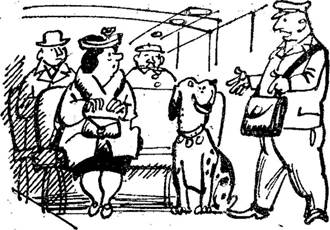
|
One wet day a woman
with a dog got on a bus.
It was a very big dog and
its feet were very dirty. The
woman said: "Oh, conductor,
if I pay for my dog, can he
have a seat like the other
passengers?"
The conductor looked at
the dog, and then he said,
"Certainly, madam, he can
have a seat like all the other passengers, but like the other pas-
sengers, he must not put his feet on it."
II. Fill in the blanks with the correct word.
1. A man came in and sat on a... in the back row. 2. To
Sharpley, miners5 were heroes, and a pit6 a,.. of wonder. 3. Raz-
1 double-decked ['dAbl'dekt]--двухэтажный
2 inside — зд. первый этаж
3 on the top —наверху
4 stout — полный
* miners —шахтеры
e pit:— шахта
liv is a sacred 1... to our people. 4. The party will be in our
club-room where there is a well-equipped2 small stage3 and... for a
hundred or more. 5. The drifting ice-floe was so small that there
was no... for even a light plane. 6. People used to bring them
wool from far-away....7. We have found... for one more
article in our wall-newspaper. 8. Mother asked me to nail a new
shelf to the kitchen wall to make more... for utensils4. 9. There
are two... in the balcony; you may take them. 10. If I were
in your... I would let her alone. 11. "Make... for me, will
you?" said Pavel. 12. There are no more chairs, so you must use
that box as a.... 13. What splendid...! We'll be able to
see everything from here.
III. Translate the following into English.
1. Пассажир занял свободное место у окна. 2. Если бы вам
пришлось побывать в Лондоне, какие достопримечательные мес-
та вы хотели бы посмотреть там? 3. Не торопитесь, всем места
• хватит. В автобусе 80 мест. 4. Этот письменный стол очень удо-
бен, но он занимает много места. 5. Простите, но это мое место.
Вот мой битет. 6. — Положи мою книгу к себе в портфель, а
то мой полон. — Но у меня тоже нет места. 7. Он очень акку-
ратен. У него все на своем месте. 8. Какое хорошее место для
игры в теннис! 9. На диване есть место еще для одного чело-
века.
IV. Talk about l) your classroom, 2) your flat. Say if they are roomy. Use
this structure There is (there is no) room for...
Model: There is room for another table in our classroom.
There is no room for another cupboard in our kitchen.
V. Say what seats you prefer when you go to the theatre or to the cinema
and why you prefer them.
VI. Speak about the places of interest in your home town, and the places of
recreation. Do they attract many people? Why?
VII. Speak about these pictures:
a) say if the canteen is roomy and comfortable, if all the seats are occupied
and why the diners make use of the chandelier to hang their coats on.
There are words below to help you.
1 sacred ['seiknd]—священный
2 well-equipped ['wel I'kwipt] — хорошо оборудованный
3 stage—сцена
* utensils [ju:'tensilz]—кухонная утварь

|
canteen [ksen'tim] —
столовая
diners ['dainaz]—обе-
дающие
cloak-room — разде-
валка, гардероб
chandelier [Jaendi'ha]
— люстра
to make use of — вос-
пользоваться, пользо-
ваться
b) say what the'scientists are doing and why they want the workman to keep
on painting.

to prove a theorem ['вюгэт]—доказывать теорему
scientist ['sawntist]—ученый
TIMJS FOR FUX
Sergeant', Why is it important not to lose your head in an
attack?
Recruit:1 Because that would leave no place to put your helmet.2
1 recruit [n'kru:t] —новобранец, вновь призванный в армию
2 helmet — каска
# * *
Soprano: Did you notice how my voice filled the hall last night?
Contralto: Yes, dear, in fact, I noticed several people leaving to
make room for it.
* * *
Mother: Now, dear, why don't you run and give grandpa a kiss?
Child (looking in surprise at grandpa's moustache1 and beard2):
I don't see any place for it, mamma.

|
TO AWARD, TO REWARD
"Oh, Bee, aren't you bored3 work-
ing hard on such a day, so bright
and sunny?"
"No," said Bee, "I've rich reward,
and that reward is honey."4
Every year in April, the month of Lenin's birth, the most
outstanding fighters for peace are awarded the Lenin Prize For
the Promotion of Peace Among Nations* к special committee con-
siders the candidates for these awards and after careful consider-
ation it gives the Lenin Prize to the most outstanding champi-
ons of peace.6
Awards of different kinds are given to those who excel them-
selves7 in labour or display courage.8 The best labourers are awarded
the title of Hero of Socialist Labour. Those who display the
greatest bravery are awarded the title of Hero of the Soviet Union.
Not only adults, but children too, may be awarded a prize if
they do well in something. There are probably boys and girls
among you who have been awarded medals For Saving a Drowning
1 moustache [mas'taf] — усы
2 beard [biad] — борода
3 aren't you bored — не скучно ли тебе
4 honey ['плт]— мед
5 For the Promotion of Peace Among' Nations —«.За укрепление мира
между народами»
6 champion of peace—борец за мир
7 to excel [ik'sel] oneself —отличиться
8 to display courage J/kAndg} — проявить храбрость
Man or For Helping During a Fire. One boy saved a drowning
child. The girl's mother warmly thanked the boy and offered him
a sum of money as a reward for his good deed. The boy politely
refused it. "It's a duty of any man to help those who are in
trouble," he said. "It doesn't need any reward."
However his noble conductl was rewarded with the happy smile
of the little girl who in that way expressed her gratitude2 to the
boy.
REMEMBER:
To award means to give a prize, an order, a medal, a badge,
etc. in honour of good work or a brave action.
To reward means to give something (money, some valuable
thing, a present, etc.) in return for a good deed or service.
The corresponding nouns are award and reward.
in reward for... — в награду за...
"The reward of a thing well done, is to have done it."
Ralph Waldo Emerson
Exercises
I. Fill in the blanks with the verbs to award and to reward or the correspond-
ing nouns.
1. The remarkable Soviet physicist Professor Landau was
the Order of Lenin to mark his 60th birthday. 2. Fourteen-year-old
pioneer Lenya Golikov was... the title of Hero of the Soviet
Union for taking prisoner a prominent German general whose
bag contained operational plans. 3. Gardeners are..... for being
generous3 to their flowers. 4. Jack's dog received an... at the
dog show. 5. The notice read: "Whoever returns the lost watch
will receive a...," 6. "Tell me and you will be richly..." —
said the King to his servant. 7. He certainly will get an...
for his outstanding bravery. 8. Eugenie Cotton, a French woman,
devoted her life to the struggle for peace, she was... the Inter-
national Lenin Prize For the Promotion of Peace Among Nations.
9. Gold medals were... to the pupils who did well in their
1 noble conduct ['noubl 'kondakt]—благородный поступок
2 gratitude ['graetitju:dj—благодарность
8 to be generous ['dsenarasj — зд. хорошо ухаживать
studies. 10; You must... her for her industry and devotion to
you. 11. It was a small... for the years of hardship1 she had
suffered. 12. Laurie taught the horse different tricks2 by always...
success with a lump of sugar.
II. Complete these sentences by translating the phrases in the margin into
English.
1. A driver from Byelorussia
who averted3 a train crash
2. Pioneers' clubs and orga-
nizations who regularly
send reports of their acti-
vities to Pionerskaya
Pravda
3. "A bag of gold and the
King's daughter,"
4. "My son," said the Khan,
"your wood-carver4 excel-
led himself."
5. His poems were of such
quality that they came to
the notice5 of the Queen,
6. Very often during his long
journey the man went with-
out enough to eat6, so
when at last he came home
7. By a decree of the Presi-
dium of the Supreme Soviet
of the USSR, Academician
Cherenkov
был награжден орденом «Знак
почета» (the Order of the Badge
of Honour).
были награждены грамотами
(papers of honour) и специаль-
ными значками.
потребовал Тимоти в награду
за спасение города от дракона
(dragon).
«Дай ему достаточное (fitting)
вознаграждение».
и он был награжден специаль-
ной премией (prize).
он наградил себя вкусным
(delicious) обедом.
был награжден орденом Ленина
за выдающиеся заслуги (merits)
в ядерных исследованиях
(nuclear research).
III. Study the story in the pictures, and answer the following questions.
1 hardship—трудность, невзгода
2 trick —трюк, номер
3 to avert [a'va:t] — предотвращать
4 wood-carver ['wud,kcuv3]-— резчик по дереву
6 they came to the notice—на них обратила внимание
е to go without enough to eat — недоедать

editor fedita] — редактор
editorial office — редакция
announcement [s'naunsmant] —объявление
to publish f'pAbhJ] — опубликовывать
1. What did the man offer in reward for his dog?
2. Why is a stranger attracted by the dog?
3. Is there any hope of him getting the reward?
4. What does the stranger pass by?
5. What does he decide to do? Why?
6. Was the dog a success at the show? Why do you think so?
7. Did the stranger get the reward?
IV. Read and answer the questions.
On November 5, 1956, the Y.C.L. г was awarded its fifth
order—the Order of Lenin. The Soviet Youth received this
high award for their achievements in socialist construction work3
and especially for their selfless work in the development of the
virgin lands.3 What are the other orders that the Y.C.L. has
been awarded?
V. Talk about your relations, friends or acquaintances any who have been given
an award. For what were they awarded? What were their awards?
1 The Y.C.L.—the Young Communist League—Коммунистический Союз Моло-
дежи
* construction work —стройки, строительство
* virgin ['va:d3mj lands —целинные земли
VI. Retell this story in English, paying attention to the words in italics.
КУПЕЦ И ЛЕНИВЦЫ
Однажды к купцу (merchant) пришли несколько ленивцев и
стали просить денег.
Я награжу того из вас, кто окажется самым ленивым,— отве-
тил купец.
Мало-помалу все ленивцы разошлись, остались только двое.
Им очень хотелось получить награду, но они не знали, как это
сделать. Одному из них пришла в голову блестящая мысль: он
принес дров (firewood) в комнату, где находился, поджег их, сам
сел на кровать и закричал:
— Спасите меня! Спасите меня!
Второй же, сидя рядом, спокойно сказал:
— Братец, попроси, чтобы меня тоже спасли!
Он-то и получил награду.
VII. Try to recollect.
J."A Russian writer who has been awarded the Pushkin prize.
2. Which Soviet poet was first awarded the Order of the Red
Banner?
TIME FOR FUN
Charlie Chaplin Competitions1 often used to be organized in the
United States of America. The best imitator2 of the great actor
was awarded a special prize. One such competition was secretly
attended by Charlie Chaplin himself who took part in the compe-
tition. Great was his surprise when the committee only awarded
him the third prize.
. * * *
When Walter Scott, the famous Scottish novelist, was riding
once with a friend near his country cottage, he came to a gate,
which a beggar 3 quickly opened for him. Walter Scott wanted to
reward the man by giving him a sixpence,4 but found that he only
1 Charlie Chaplin Competitions —Конкурс на лучшую имитацию Чарли Чаплина
2 imitator ['imiteita] — имитатор
8 a beggar—нищий
* sixpence —монета в шесть пенсов
7G
had a shilling. He said, "Here is a shilling for you, but remember
that you owe1 me sixpence."
"God bless your honour," said the. beggar, "may you live till
I pay you?"
A cunning2 beggar, wasn't he?
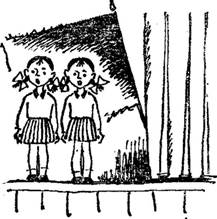
|

|
LIKE, ALIKE
They are alike
in everything.
A: What pretty girls! And so very much like each other.
B: That's because they are sisters.
A: They are as alike as two drops of milk, I can hardly tell3
one from the other. And they speak very much alike. Are they
twins?4
B: Yes, they are, that's why they are dressed alike too. They
always wear identical - clothes. Now let's listen to what they are
reciting.
SOME CHILDREN
(abridged)
1.
Some children are brown
like newly baked bread,s
Some children are yellow
and some are red,
Some children are white
and some are almost blue,
Their colours are different
the children like you.
1 to owe [ои^быть в долгу, быть должным
2 cunning —хитрый
3 to tell -^-отличать, различать
* twins —близнецы
5 identical [ai'dentikal] —одинаковый
0 newly baked bread — только что испеченный хлеб.
2. 3.
Some children have houses
of stone in the streets,
Some live in igloos
and some live on the fleets. 1
Some live in old strawhuts a
and some in new —
Their homes may be different —
the children like you.
Some children are French
and some are from Japan,
Some are Norwegian
and some are from Sudan.
Oh, yes, we have children
in valley, on pike.3
Their countries are different
the children alike!
4.
Oh, if they could dance
and if they could play
altogether, together
a wonderful dayl
Some could come sailing
and some could just hike!
So much would be different
the children alike,
REMEMBER:
Like and alike mean not different, similar.
Like must be followed by a noun (or pronoun), oppos. — unlike.
Alike is used predicatively4 (after a verb) and is never fol-
lowed by a noun (or pronoun), oppos.— different.
alike as two peas (two drops of milk) — похожие как две капли
воды
like a cat on hot bricks —как на иголках
like a needle in a haystack —словно иголка в стоге сена
like this (like that) —так, подобным образом
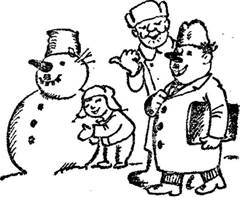
|
Exercises
I. Answer the questions about the pictures
below, using like or alike.
Why does the man think that the
child is a gifted sculptor^?
1 fleet— ад. плот
2 strawhut ['strp:,hAtj —хижина из соломы
3 pike—вершина, гора
4 predicatively [pn'dikativh] — как именная часть составного сказуемого
Б gifted sculptor ['giftid 'skAlpta]—талантливый скульптор

II. Fill in the blanks with like or alike.
THE TWO BULLS1
It so happened that a cow had two calves2 so very much.. ♦
that even the cow couldn't tell them apart.
The calves grew up into strong little bulls but they remained
much... each other. One day they went to a smith3 and asked him,
"Tell us why everyone has different names except us?" The smith
showed them a piece of iron and asked, "What's this?" "That's a
horseshoe,"4 the bulls answered in chorus. The smith held out an
other horseshoe. "And what is this called?" "That's a horseshoe,
too!" the bulls again spoke....
"That's right," said the smith. "They look... and that's why
they are called by the same name: horseshoe."
"But it can happen that one horseshoe lies around without being
of any use and loses its lustre,5 while the other shines because of
all the work it does. So the first one will be called "Rusty",6 while
* bull [bul]— бык
2 calf [каП—теленок
8 smith — кузнец
* horseshoe ['hasju:] — подкова
* to lose Its lustre flAsta]— терять свой блеск
* Rusty —Ржавый
people will call the other one "Brilliant".1 Yon, too, look... and
\ou, too, will he given names when people see how you work!"
The bulls thought over this and then one of them raised his
head and said, "Give us some work to do." The smith loaded two
carts2 and harnessed3 the bulls to them. The bulls drew the cart
along very well until they came to a hill. Here one of them began
to lag behind 4 and after a while stopped. "Lazy-bones!6 Lazy-bones!"
people began shouting. The bull was ashamed and wanted to
draw the cart, but laziness overcame him again.
The other bull was not... the first one. He climbed the hill
without stopping for breath.
After this every one could easily tell one from the other. And
that is how they got their names: Lazy-bones and Hardworking.
III. Make up sentences by combining the parts in column A with those in col-
umn B.
 A.
A.
1. The rocket stands upright...
2. There are no twosnowflakes6
which are exactly...
3. We were...
4. The nerves of pilots must
be...
5. This handwriting0 is...
6. I wish I could do it...
7. Meetings in schoolrooms, at
streets' corners and in work-
ers' homes came...
8. Every instrument has its own
particular personality just...
B.
alike.
like steel.7
like the tracks of an inky spider.8
like a tender plant.
alike to her.
like a human being, a singing
bird or an animal,
like coffee,
like his father,
like a huge silver pencil,
like feathers.50
like you.
like brothers now.
1 Brilliant —Блестящий
2 cart — телега
3 to harness — запрягать
4 to lag behind— отставать
6 Lazy-bones— Лентяй
6 snowflake —-снежинка
7 steel — сталь
8 spider— паук
* handwriting ['haend^raitirjl—почерк
10 feather [Тедэ] —перо (птичье)
9. He thinks all politicians1 alike,
are...
10. This tea tastes...
11. Boris is very much...
12. Snow falls...
13. She is treated...
IV. Use the following expressions in sentences of your own:
like a clock — точно, пунктуально, как часы
like a lamb — безропотно, покорно, как овечка
like a shot — быстро, незамедлительно
like herrings in a barrel — как селедки в бочке (в тесноте)
like a bolt out of the blue — неожиданно, как гром с ясного
неба
to sleep like a top — спать очень крепко, как убитому
V. Tell the story of the pictures, using like and alike.
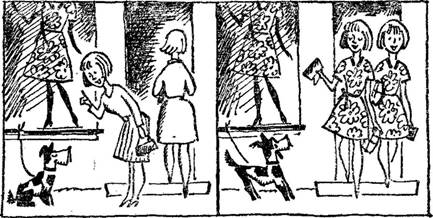
|
mistress — хозяйка
store—магазин
frock — платье
to bark — лаять
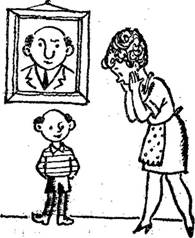
|
hair-do ['headu:]— прическа
barber ['ЬаЬз] — парикмахерская
1 politician [,poli'tiJn] — политик
VI. Do you remember:
1. What other birds do not use their wings for flying, like pen-
guins?
2. What bird roars1 like a lion, hisses3 like a snake and kicks like
a horse?
3. What creatures have no eyelids, like fish?
TIME FOB FUN
ALIKE
Dick\ Why is a loaf of bread like the sun?
Nick: I don't know..
Dick: Because it's not light until it rises.
LIKE HIS FATHER'S HANDWRITING
Teacher {examining homework): Jim, this looks like your father's
handwriting.
Jim: No wonder, I used his fountain-pen.
* * *
Betty was being taken to the museum by his auntie. They went
into the Egyptian room, and there saw a mummy.3 Betty asked
what it was.
"That's someone's mummy, dear," answered auntie.
"Oh, auntie, I'm glad my mummy's not like that!"
* * *
New Maid:4 How do I announce dinner? Do I say "Dinner is ready"
or "Dinner is served"?6
Mistress: If it is like it was yesterday say "Dinner is burnt."8
* * *
Lady (in the theatre): Pardon me, sir, does my hat bother you?.
Gentleman behind: No, but it bothers my wife, she wants one
like it.
1 to roar [ro:] — рычать
2 to hiss —шипеть
3 mummy— 1) мумия, 2) мама (дет., разг.)
* maid [merd]—служанка
6 dinner is served —обед подан
6 to bum (burnt, burnt) —жечь, сжигать
TO BREAK, TO DESTROY
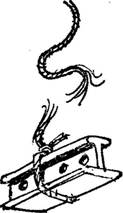
|

|
"Who has broken
the window?"
The weight was too
great and the string
broke.

|
Too many people were
sitting on the bench. No
wonder it broke.
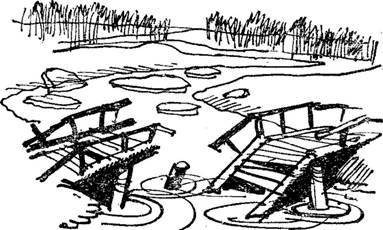
|
The spring flood has
destroyed the bridge.
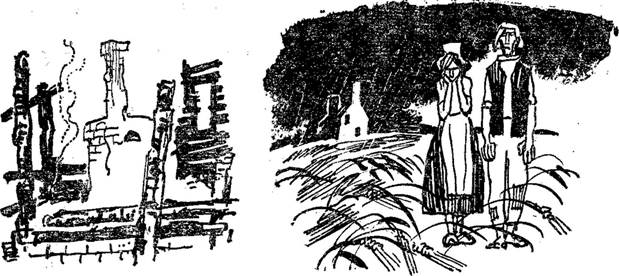
The house was destroyed The hailstorm destroyed
by the fire. the crop.
REMEMBER:
To break means to come into two or more pieces either on
purpose or by accident.
To destroy means to make useless, to put an end to something.
To break a promise, a law — нарушить обещание, закон
"If the enemy does not surrender, he is destroyed." (M. Gorky)
Exercises
l. Fill in the blanks with to break or to destroy, using the correct tense.
A LACONIC ANSWER
The Lacons lived in a part of Southern Greece called Laconia,
and were known for their bravery and simplicity.1 They were justa
and honest, they never... a promise or a law. One of their rules
was always to speak briefly, using no more words than were need-
ed. The best example of this is the reply the Lacons gave to Phi-
lip of Macedon.
Philip wanted to become master of all Greece. When only La-
conia.remained unconquered3 by him he sent a letter to the brave
1 simplicity [sim'phsiti] — простота
2 just [d3Ast]—справедливый _.,.:,
3 remained unconquered [лп'кэдкэд]—осталась,незахваченной.
Laccns, saying: "If I invade1 your country, I will... vour great
city."
In a few days an answer was brought to him with only one
word in it—"If/
II. Ask these drawn in the pictures not to do what they are doing.
Give your reasoning, using the words to break or to destroy.
Model: Don't juggle2 with the plate, or you'll break it.

1. 2.
to balance — балансировать to play with matches —играть
ladder — лестница со спичками
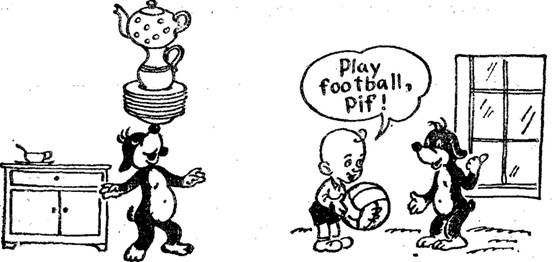
3. 4.
to dance — танцевать to play football — играть в футбол
dishes — посуда
1 to invade—вторгаться, захватывать
2 to juggle 1'<*5лд1] — жонглировать
III. Arrange these words in suitable pairs to make up the combinations listed
below.
to break cup, hopes, promise, bridge, glass, tree, enemy, belief,
to destroy house, town, arm, pencil, nest, glasses, silence, power,
law
разбить надежды, разбить чашку, разрушить мост, разбить
врага, разбить веру, разбить стекло, разрушить дом, разру-
шить город, сломать дерево, сломать руку, сломать карандаш,
разрушить гнездо, разбить очки, нарушить тишину, сверг-
нуть власть, нарушить обещание, нарушить закон.
IV. Tell the stories of the pictures according to the questions. Use the words
to break or to destroy.

1. Why is Pif horrified?1 What happened to the vase?
2. Does he have any imagination? 2 What's he doing now?
3. Is the woman pleased with Pif? Why?

1. Was the fish big? Why do you think so?
2. What's the man telling Pif?
3. Why did Pif decide to use a lamp-pole3 and a chain4 in-
stead of a rod? 5
1 to be horrified ['honfaid] — ужасаться
2 imagination [i,m3ed3i'neijn] — воображение
3 lamp-pole. — фонарный столб
4 chain [tfemj — цепь
6 rod— удочка
V. Render the following into English, paying special attention to the use of the
words in italics.
— Мама, — спрашивает маленькая Катрин,—ты знаешь вазу,
которая в нашем роду (family) переходит из поколения (genera-
tion) в поколение?
— Конечно, знаю. Ну и что же?
— Я хотела тебе сообщить, что мое поколение разбило ее.
* * *
Известный итальянский дирижер (conductor) Тосканини часто
сердился на репетиции (rehearsal) и нередко ломал все, что попа-
далось под руку. Однажды он со злостью бросил на пол свои
дорогие часы и разбил их. Музыканты решили подарить (to pre-
sent) Тосканини двое дешевых часов, которые дирижер принял
с благодарностью. Вскоре их постигла та же участь — на неудач-
ных (unsuccessful) репетициях они были разбиты вдребезги.
TIME FOR FUN
THE PROOF * IS A BROKEN LEG
A charwoman3 in a City office was very proud of her skill at
polishing3 floors.
"When I started working there," she told a friend, "the floors
were in a terrible state. But now it's quite different since I've been
polishing them," she added proudly. "Three men working there
have fallen down. One of them is still in hospital with a broken leg."
SAFE ON THE GROUND4
Pilot: Why weren't you ever a pilot?
Mechanic: On account5 of a broken neck.
Pilot: But you haven't got a broken neck?
Mechanic: That's just it. I don't want one!
1 proof—доказательство
2 charwoman ['tfa:,wum9n] — уборщица
3 to polish — натирать (полы)
4 Safe on the Ground — надежность твердой почвы
5 On account [a'kaunt] — по случаю
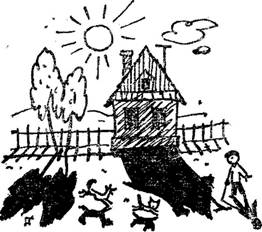
|
SHADE, SHADOW
There is your shadow. What
produces it? Sunlight cannot go
through your body; your back stops
it, and it doesn't reach the ground
in front of you. So there is the
shape of your body on the ground
where there is no sunlight. That is
called your shadow,
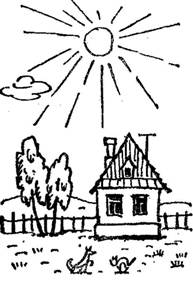
|
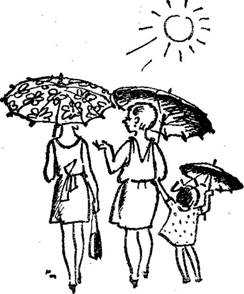
|
You can see the shadows of trees,
houses, fences and animals here, too.
As the sun gets higher and higher,
shadows grow shorter and shorter,
until at noon there is hardly any
shadow at all.

How hot it is in the afternoon!
Everyone likes to sit in the shade.
Even the cat, which is not fond
of cold, is looking for a place in
the shade.
On hot days women use umbrel-
las as shades.
REMEMBER:
Shade is a place where the sun's (or the moon's) rays do not
fall, oppos. — light.
A shadow is shade of a definite shape.
The shade of a tree means a place protected by a tree from the
sun or light; the shadow of a tree is shade that has the shape
of a tree.
Proverbs:
A crooked stick has a crooked shadow. (От кривой палки —кри-
вая тень.)
Cowards are frightened of their own shadow. (Трус боится и
собственной тени. У страха глаза велики.)
Don't judge your importance by the shadow of the morning sun.
(He судите о себе по длине собственной тени 'в утренние часы.)
Exercises
I. Look at the pictures and answer the question.
Shade or shadow?

II. Fill in the blanks with the correct word.
1. It is a great pleasure indeed to spend some time resting on
a bench in the... of trees. 2. You won't get sunburnt 1 if you
lie in the.... 3. When I was a small girl, I often tried to
step 2 on my own... but I could never do it. 4. But when I
was a small boy I tried to run away from my *.. and I could
never do it either. 5. Down goes the sun and throws long....
6. When these trees grow up they will make a pleasant....7. My
feet were bare3 and I could stand only in the... of a tree.
8. Quite suddenly a dark figure appeared on the path. It ran
past.the front door and disappeared4 in the... of the wall.
9. He is not a brave man. He seems to be afraid of his own....
10. By her... we could see that the woman was wearing a
hat. 11. Suddenly a... fell on the ground between him and
the porch5 on which he was sitting. 12. When the children saw
the worm6 they jumped and shouted and went quickly back into
the house like chickens, as frightened by their own..». 13. The
dog found a spot in the... and lay down there to sleep.
14. The large trees made a very pleasant.... 15. Why do you
always follow him as if you were his...?
III. Look at the picture and answer these questions.
1. Are the people sitting in the sun?
2. Are they sitting in the shade of the tree?
3. What things and objects are in the shade?
4. Do you see a shadow in the picture? Whose shadow is it?
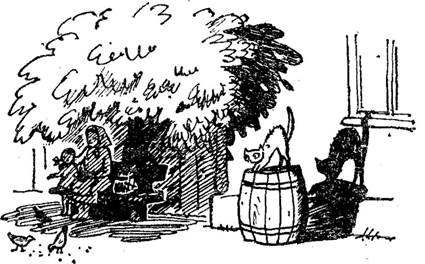
|
1 to get sunburnt ['sun-
bant]— обгореть на
солнце, перегреться
2 to step— становиться,
наступать
? bare [Ьеэ]—оголенный,
босой
4 to disappear [^disa'pis]—■
исчезать
6 porch — крыльцо
6 worm [w3:m] — червь
| IV. Talk about the pictures. |
<